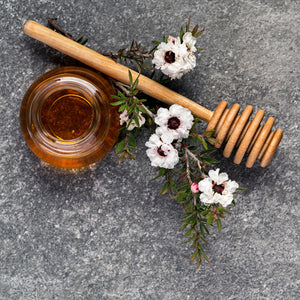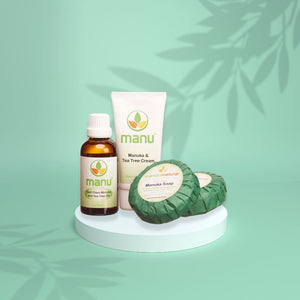Manuka essential oil, derived from the leaves and branches of the Leptospermum scoparium plant native to New Zealand, is a powerful, versatile oil widely celebrated for its therapeutic properties. While manuka honey has long been known for its medicinal benefits, manuka essential oil offers its own range of health-enhancing qualities. Known for its antimicrobial, anti-inflammatory, and healing effects, this essential oil has become increasingly popular in natural health circles.
Origin and Extraction of Manuka Essential Oil
Manuka essential oil is extracted through steam distillation from the leaves and small branches of the manuka plant, also known as the New Zealand tea tree. The Leptospermum scoparium thrives in the country’s coastal and mountainous regions. Indigenous Māori communities have historically used manuka for its medicinal properties, including treating wounds, fevers, and respiratory conditions.

Although manuka oil shares similarities with tea tree oil, another powerful antimicrobial agent, it is distinct in its chemical composition, offering additional benefits that are unique to its native environment.
Key Therapeutic Effects of Manuka Essential Oil
Manuka essential oil is revered for its wide array of therapeutic benefits, making it a key ingredient in skincare, personal care, and aromatherapy products.
a. Antibacterial, Antifungic and Antiviral Properties of Manuka Essential Oil
One of the most notable attributes of manuka oil is its potent antimicrobial effects. Scientific studies have demonstrated its ability to combat a variety of bacteria, fungi, and viruses. This makes it a powerful agent for treating infections, both topically and through inhalation. It is particularly effective against Staphylococcus aureus, a bacteria known for causing skin infections, and various types of fungi like Candida albicans, responsible for yeast infections.

b. Anti-Inflammatory and Pain-Relief Effects
Manuka essential oil is also widely recognized for its anti-inflammatory properties. When applied topically, it helps reduce inflammation and irritation, making it an ideal treatment for conditions such as eczema, dermatitis, and psoriasis. Additionally, its analgesic properties can provide relief from joint pain, muscle aches, and conditions like arthritis.
c. Skin Healing and Regeneration
Manuka oil is widely used in skincare for its ability to promote the healing of wounds, cuts, and abrasions. Its antibacterial nature helps prevent infections in wounds, while its anti-inflammatory qualities reduce redness and swelling. Additionally, manuka essential oil promotes skin regeneration and can help reduce the appearance of scars, blemishes, and sun damage.

d. Respiratory Support
When diffused or inhaled, manuka essential oil provides significant benefits for respiratory health. Its decongestant properties make it an excellent natural remedy for colds, sinus infections, and bronchial congestion. Inhalation of manuka oil can help loosen mucus, clear blocked nasal passages, and alleviate breathing difficulties.
e. Stress Reduction and Emotional Well-being
Manuka oil is widely used in aromatherapy for its calming and grounding properties. Its warm, earthy scent helps to reduce stress, anxiety, and mental fatigue. When diffused, manuka essential oil can create a relaxing atmosphere that promotes mental clarity and emotional balance. This makes it ideal for use during meditation or before sleep.
Utilization of Manuka Essential Oil
Manuka essential oil is highly versatile and can be used in various ways depending on the desired therapeutic effect.
a. Topical Application for Skin Care
For treating skin conditions like acne, eczema, or minor cuts, manuka oil can be applied topically, often diluted with a carrier oil (such as coconut or jojoba oil). Its antibacterial and anti-inflammatory properties make it effective for reducing acne, treating fungal infections, and soothing irritated skin.

To promote wound healing, a few drops of manuka oil can be mixed with a carrier oil and applied directly to the affected area. It can also be used in salves or balms to treat bug bites, burns, or rashes.
b. Diffusion for Aromatherapy and Respiratory Health
Manuka essential oil can be diffused to promote relaxation, clear the respiratory tract, or improve air quality. Adding a few drops to an essential oil diffuser can create a calming environment, ideal for stress relief or sleep enhancement.
For respiratory relief, manuka oil can be combined with other essential oils like eucalyptus or peppermint and inhaled directly from a steam bath or vaporizer.
c. Bath and Massage Oils
Manuka essential oil can be added to a warm bath to relieve muscular aches, joint pain, or simply as a way to relax after a stressful day. Blending the oil with a carrier oil and massaging it into sore muscles provides a warming, pain-relieving effect.
d. Hair and Scalp Treatments
Manuka oil is effective for scalp care, helping to treat dandruff, soothe itchy scalp, and combat scalp infections. When mixed with a carrier oil and massaged into the scalp, it can improve the overall health of the hair and prevent hair loss caused by scalp infections or inflammation.
e. Household Cleaning Products
Given its potent antimicrobial properties, manuka essential oil can also be added to homemade cleaning solutions to disinfect surfaces. It’s particularly useful in kitchens and bathrooms where bacteria and mold tend to thrive.
Safety and Precautions
While manuka essential oil is generally considered safe, it is important to follow proper usage guidelines to avoid adverse reactions. When applied topically, manuka oil should be diluted with a carrier oil to prevent skin irritation. A patch test is recommended before using the oil on larger skin areas to check for allergic reactions.
Additionally, manuka oil should not be ingested unless under the guidance of a qualified healthcare provider, as some essential oils can be toxic if swallowed. Pregnant or breastfeeding women, as well as individuals with sensitive skin or underlying health conditions, should consult a healthcare professional before using manuka oil.
Conclusion
Manuka essential oil is a potent and versatile natural remedy that offers a wide range of therapeutic benefits. From its antimicrobial properties that help fight infections to its skin-soothing and respiratory-relieving effects, it has become a sought-after ingredient in both traditional and modern holistic practices. Whether used in skincare routines, aromatherapy sessions, or household cleaning products, this unique essential oil is a valuable addition to any natural health toolkit.
For more informations about the benefits of Manuka Essential Oil, please to visit: https://www.manukanatural.com/




Leave a comment